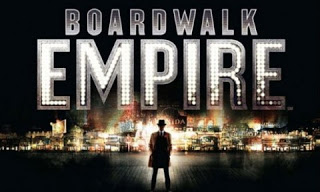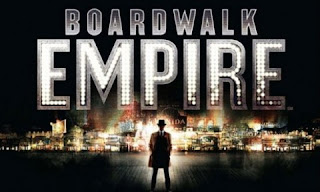With its first season complete and two Golden Globes under its belt (Best TV Drama and Best Actor in a TV Drama), Boardwalk Empire, HBO’s prohibition-era Sopranos/Mad Men hybrid, has gotten plenty of attention. And it’s something feminists should be paying attention to as well. Like Mad Men, the show doesn’t gloss over the sexist elements of the era, but instead exposes them in both stark contrast and comparison to how we view women in our society today.
The Peggy Olsen of the series is found in Margaret Schroeder (played brilliantly by Kelly Macdonald), who is wise beyond her era, yet remains limited by her gender. At the start of the series, we see her suffer physical abuse by her husband (so much so that she miscarries, and not for the first time). When she appeals to a wealthy politician (our protagonist Nucky Thompson, played by Steve Buscemi) to find work for her husband, he takes her under his wing, eliminating her abusive husband and setting her up with a job in a fancy dress shop. It is here that we encounter the division of class between the clientele and Margaret, an Irish immigrant whose boss assumes is uneducated and dirty (other ethnic and religious tensions abound in the turf wars between the Irish, Italian, and Greek mobs throughout the season). Soon Nucky takes a romantic interest in Margaret and offers to put her and her children up, though he won’t marry her. Margaret must weigh the costs/benefits of this situation (security for her and her children versus her neighbors thinking she’s a whore), but in the end she doesn’t have much of a choice, like most women in this show and of this era. But despite the boundaries around her, Margaret remains well-read, involved in local politics and with the Women’s Temperance Movement, and takes control of her sexuality (in the 1920s, birth control meant douching with Lysol). It is her struggle for both mere survival and to retain her honor in a time when the odds are against her that make her journey and triumphs so satisfying and enjoyable to watch.
The other female characters are similarly dependent on men, and either try to escape this grip or find power within it. Angela (played by Aleska Palladino), who has a baby with Nucky’s protege Jimmy, dreams of running off to Paris with her lesbian lover, but she feels trapped by Jimmy, who overpowers her in every way. Jimmy’s mother, Gillian (Gretchen Mol), who had Jimmy young by a much older man, offers to take care of Angela’s son for her so that she can have a life of her own. Perhaps Gillian wished someone had offered her the same.
Though Gillian is a grandmother, she is still very young and works as a showgirl (this is an age where the only jobs for women seemed to be as dancers, prostitutes, or nannies – they either worked in childcare or for the pleasure of men). When Jimmy gets into trouble, Gretchen helps the only way she knows how – by seducing his enemy for information. Nucky’s old mistress similarly uses pregnancy as power against a prohibition agent she sleeps with. One could argue that all the women on the show use their sexuality as a type of currency, as there was little other option at the time.
There also remains the notion that women’s reproductive choices were not theirs to control. Nucky chides Margaret for using the Lysol like “any common whore,” the prohibition agent tells his barren wife to pray instead of considering an invasive medical procedure, and Jimmy decides without consulting Angela that they should have more children. This backwards thinking, however, is not far from the discussions happening today in which restrictive laws prohibit women from freely controlling their own bodies.
NYMag had argued that aside from Margaret’s character, all the other women appear to be nude decoration for the HBO premium. Upon further reflection, I’ve realized that the show doesn’t quite yet pass the Bechdel test. For those unfamiliar, to pass the test a show must 1. Have two women, 2. Who talk to each other, 3. About something other than a man. All of Margaret’s conversations are about Nucky. She speaks with Nucky’s mistress about how they’re fighting over Nucky; she speaks with a fellow “concubine” about how to keep Nucky; she even speaks with her temperance leader about whether she should accept Nucky’s offer. Even in a scene with Angela and her lover the two women talk about how they couldn’t be seen together or Nucky would cut off their money. On the one hand, this proves how so very dependent women were forced to be in this time period. On the other hand, the show’s writers could do a better job developing their female characters.
As for me (and the Golden Globes), I think this show has plenty of potential, especially when it comes to its women. What do you think? Do you watch the show? Do you root for Margaret like you do for Peggy and Joan? Leave your comments below!
Amanda ReCupido is a writer and arts publicist living in New York City. She is the author of the blog The Undomestic Goddess and can be found on Twitter at TheUndomestic.


Love this show. Kelly McDonald is killing it as Margaret Schroeder. Absolutely brilliant. Nucky is an extremely sympathetic character. You can see his rise has not been without sacrifice, but his background makes him very rich presence. The Jimmy/ Angela relationship is also beautifully complex. Not as good as Deadwood or the Sopranos, but it’s just the first season.
Hannah